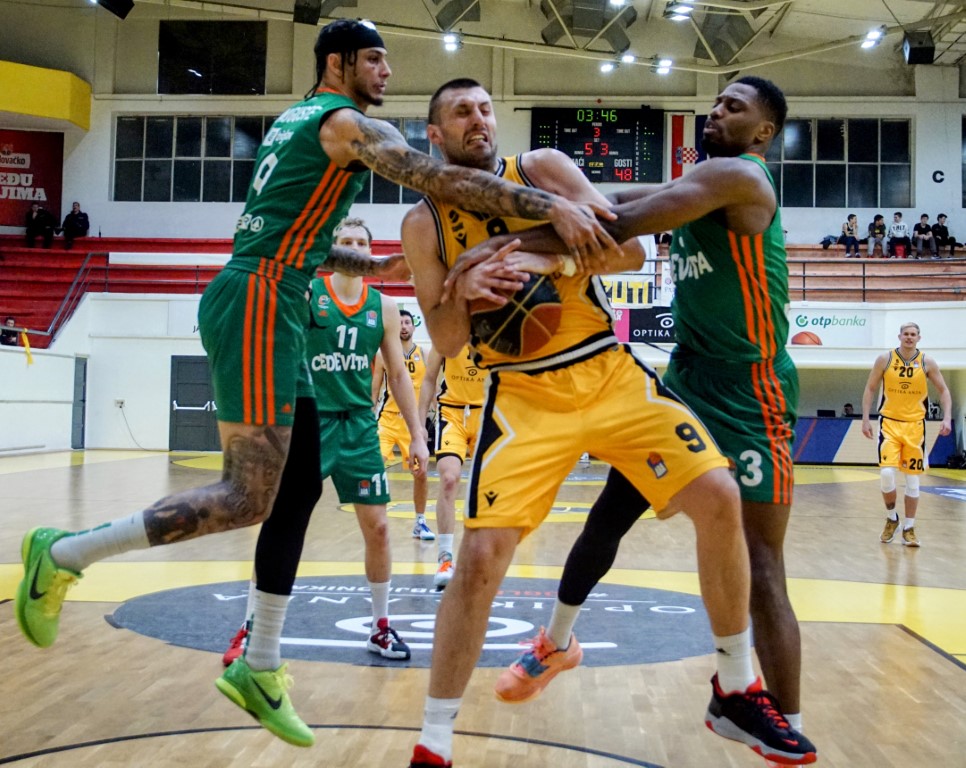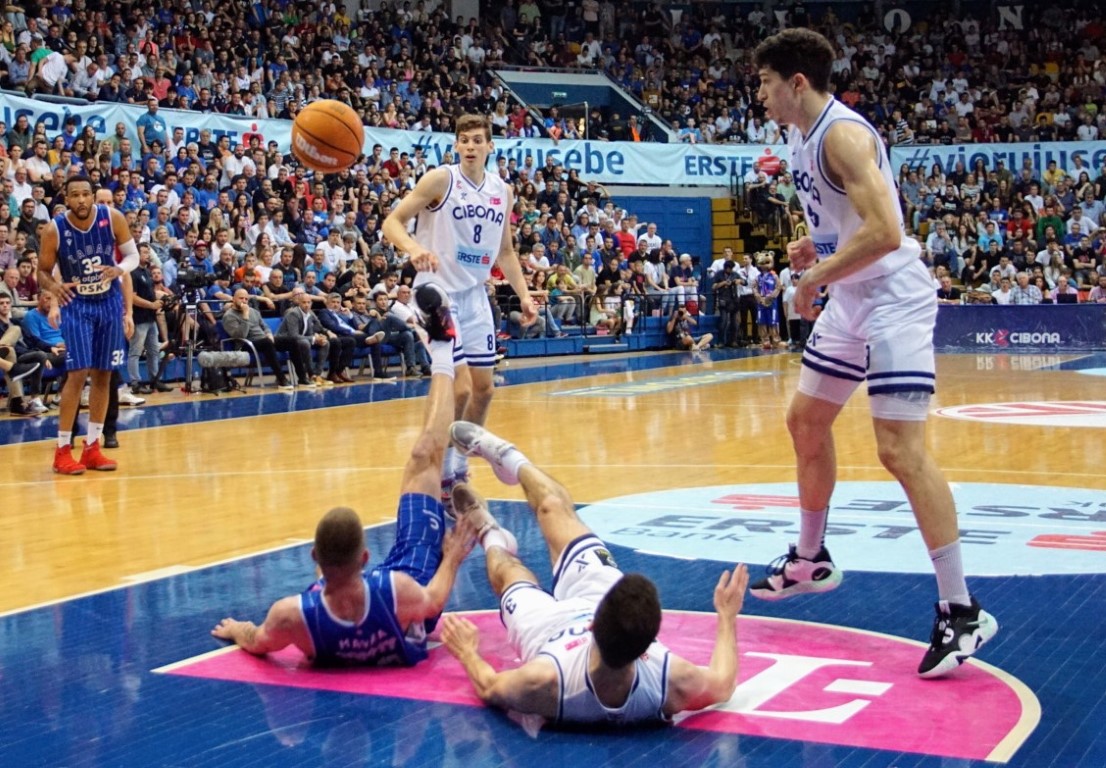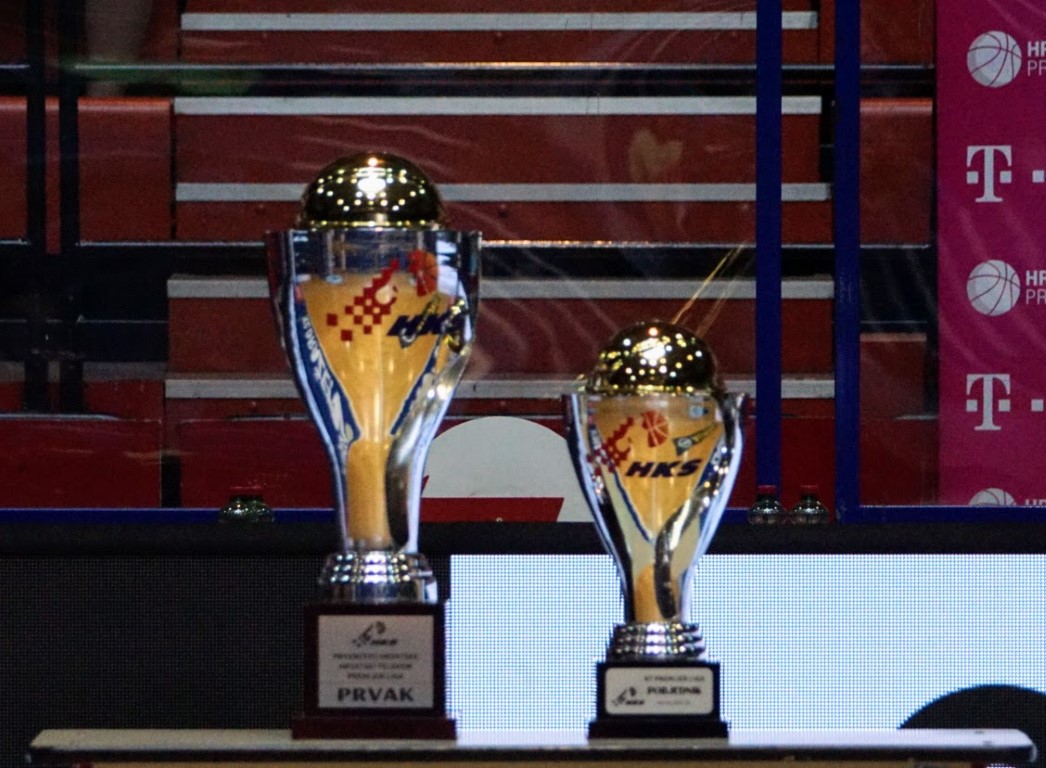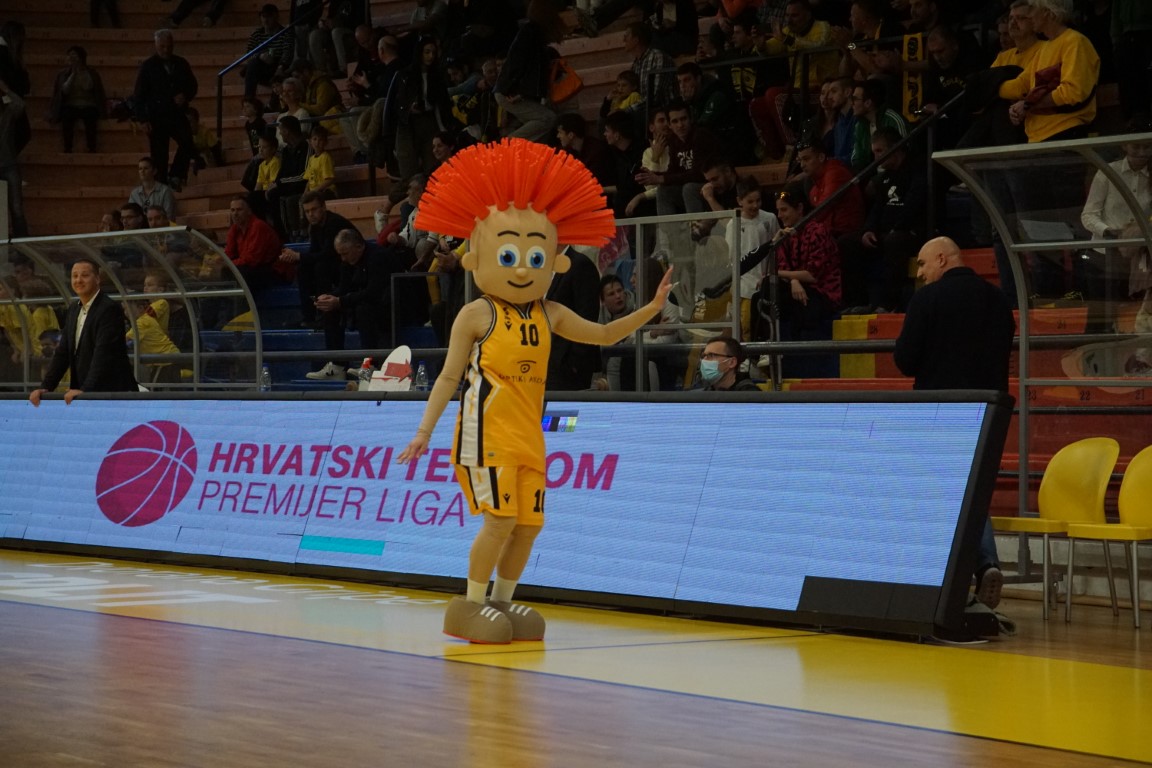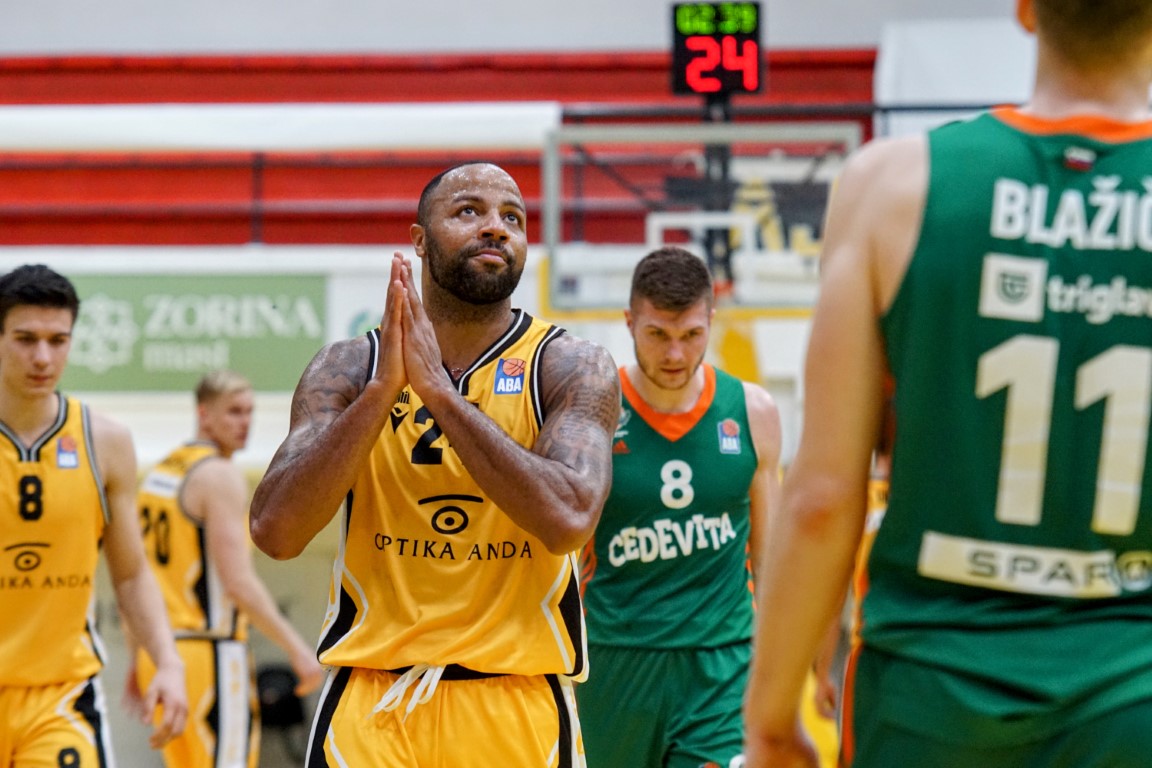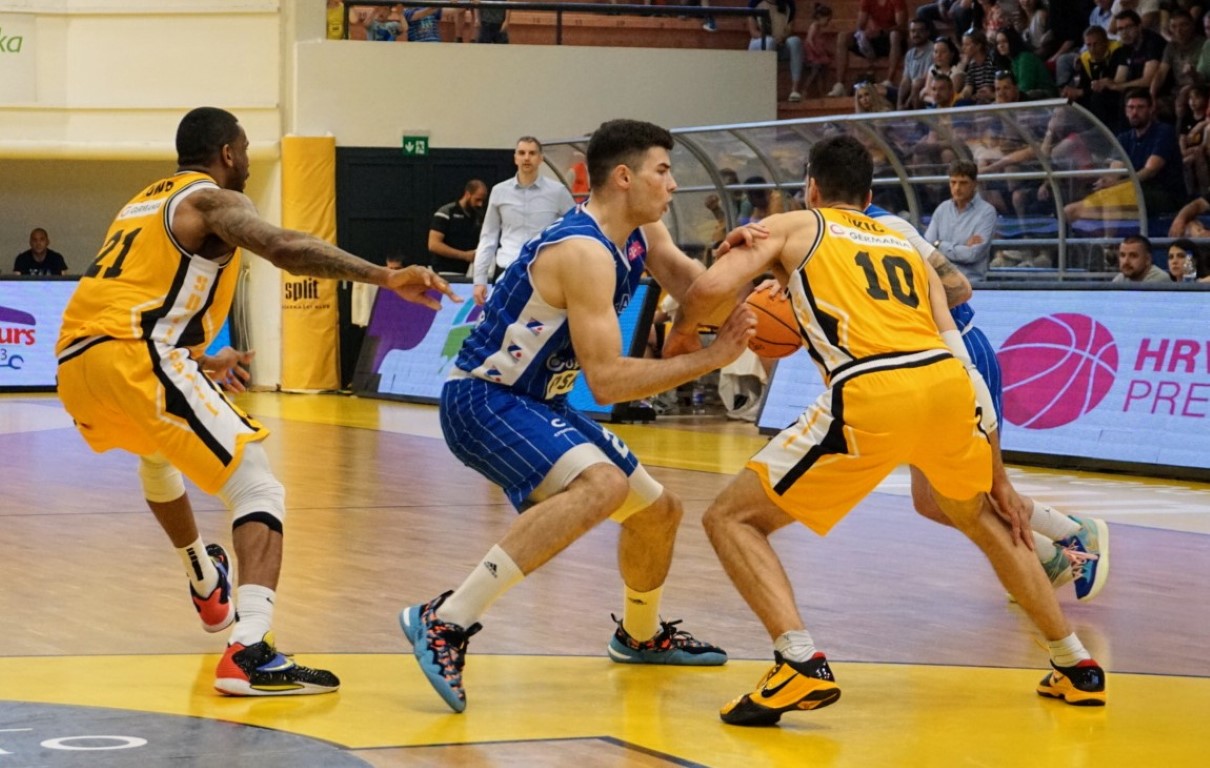KK Split is Up for Sale (Again)
Why it is not worth anything. Ništa. Not a single Lipa! (EDITORIAL)
Split, 23.08.2022 - The City of Split is again trying to find an investor for the Basketball Club KK Split. This time it is official. Read the invitation to tender here.
In the tender, the City of Split states the value of the shares which it offers for sale at 4'000'000 EUR, that's the shares it wants to sell, so they value the club at around 6 Million Euro, which is the amount at which all issued shares were handed out.
Our contributor Burak Canboy had considered to invest into the organization in 2013/2014 and has been covering the club for TCN during the last two seasons.
Here is his personal opinion on the value of the club and the politics going on right now.
EDITORIAL:
Let me say it out loud first. Those who don't want to listen to arguments may call me a traitor, a rich foreigner who doesn't understand Croatia, they may want me banished or may crucify me at the next game and then those who actually like to deal with the matter will hopefully read this opinion. In the current state, KK Split is not worth anything. Ništa. Not a single Lipa!
Now it is out. So, why do I believe the team that dominated the late eighties and early nineties, the big Jugoplastika Split that was officially named the best European club of the 20st century by FIBA is currently not worth anything? The club that resides at Gripe, a gym that was built mostly by the hands of its members. In a mecca of basketball that hosts the biggest trophies and most valuable jerseys in the "yellow salon". The club that is quite correctly called one of the most successful clubs in the history of European basketball. Winning three consecutive EuroLeague titles, two Korač Cups plus 3 Triple Crowns, 6 Yugoslav Championships, 5 Yugoslav Cups, 5 Croatian Cups and 1 Croatian Championship. A club that competes in the prestigious ABA League and plays for championships in the Croatian National League. A club that created greats like Branko Radović, Ratomir Tvrdić, Toni Kukoč, Dino Rađa, Žan Tabak, Petar Skansi, Velimir Perasović (please forgive me that I did not list everyone, it is a very long list).
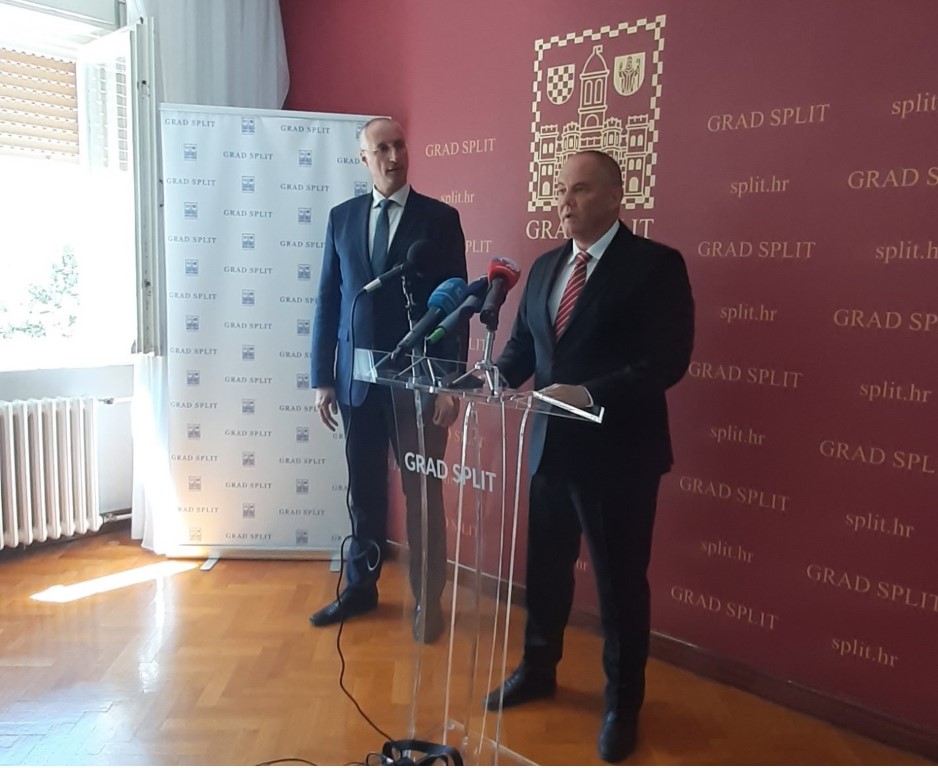
Mayor Puljak and Deputy Kuzmanić presenting their ideas for KK Split (Photo: Grad Split)
Well, in the world of business there is a word for value that cannot be measured by the sum of its assets. It is called "goodwill" or "value of intangible assets". When you look at the world's largest companies with high goodwill, Coca Cola used to be the example in the nineties, today it is companies like Microsoft and Amazon that mainly consist of value which stock markets assess because people are willing to pay more per share than the sum of assets listed in their balance sheets, divided by the amount of stocks issued. Where there is goodwill there is also the opposite. Companies worth less than their sum of assets. You hear stories of companies given away for a dollar sometimes but more often than not, those companies are not even worth the dollar. They disappear more or less silently because nobody wants to risk renovating, restructuring and rebuilding such companies.
Now that I have given a short excursion to the business world in the US, let's get back to Europe, the Balkans (or as some people like to call it Southeast Europe nowadays), Croatia, Dalmatia, Split, Gripe, KK Split. There is a reason why I am listing them in this order. but all of these have a reason why the club is not worth anything. Ništa. Not a single Lipa!
European Union:
Let's start with Europe. During the Global Financial Crisis of 2008, which became a european financial crisis in the years after and lead to Greece being put under financial supervision (which just ended a few days ago btw.), some people started to wonder how football clubs and to some extent also basketball clubs in Greece could have such huge budgets if the country is basically bankrupt. Clubs like Panathinaikos, AEK, Olympiakos and PAOK were very successful in Europe and globally known to be paying very good salaries, frequently bringing in players from the NBA or stopping players from going there.
This was not just an exclusively Greek behavior, but also quite normal in Italy, France and Spain and obviously also in most other european countries, but they are not so well known for their well paying leagues. The spotlight was just shining brightest onto Greece, while Europe wanted to stop waste of taxpayers' money.
CEDEVITA: Money goes to Slovenia now (Photo: Burak Canboy)
The clubs and local governments had become so intertwined that big parts of the clubs' budgets consisted of money being transferred from the governments to the clubs declared as "sports education", "funds for sports equipment ", "youth support", "tourism support", "business growth support", "gym maintenance " and many other creative ways. While all these can be very much in the interest of the public and are surely worth spending public money for, in most cases that money was not used for that purpose, but for the running expenses of an internationally competing professional team. This practice has been deemed illegal by the European Union and is considered a "preferred subsidizing of business". Now, the City of Split has been very creative as well in the past years, but it is quite obvious that continued participation in the ABA League and playing for championships in the croatian league would not have been possible if all salaries, participation costs and travel expenses of the professional team had had to be paid for by income from TV broadcasting rights, ticket sales, sponsors and other revenues such as sale of merchandise. During the last years the club had over and over accumulated losses that the city had to cover by increasing the capital of the club. Now, creative as it may be, in the end it is the exact behavior that the EU wanted to stop. Now, if the club did not have money coming from the city, it would be bankrupt. Worth nothing. Ništa. Not a single Lipa.
Balkans/Southeast Europe:
Yugoslavia the former world force in basketball is shattered. Romania, Bulgaria, Albania were never really big. Bosnia & Hercegovina 45th in the world, Kosovo 71st and North Macedonia 52nd play no large role, Croatia as described later is in a free fall. Serbia (4th), managed to re-establish some of the former glory, Montenegro is a recent positive surprise (25th) and Slovenia is a rising star (3rd), but in general basketball business at successful clubs is mostly run by dubious owners/presidents or player agencies often enough operating in dark grey areas of the law and federation regulations (surely nobody wants to see KK Split becoming a front for some completely illegal business). In countries that are non-EU, strong government funding is still predominant. And if you watched the finals of this year's ABA League between Partizan and Red Star you got to see how some fans like to use the game to show how ugly and disgraceful sports can be.
Extra value for the club: Ništa. Not a single Lipa.
Croatia:
The national team could not even pass a group with Finland (35th in the world) and needed 2 overtimes to barely beat Sweden once (51st in the world !), and now rightfully has to play in a group with Switzerland (world's 60th) and Austria (61st) to re-capture just the opportunity to qualify for the World Cup in 2025.
Zadar and CIBONA on the floor? (Photo: Burak Canboy)
KK Split's competitors in the national league
- CEDEVITA, has seen the big money move to Slovenia.
- CIBONA is clinically dead, pretty much bankrupt, kept alive with tax payers' money and/or lack of transparency.
- KK Zadar is clinically dead, kept alive with tax payers' money and/or lack of transparency.
Most other clubs in the croatian league are - yes you guessed it right - clinically dead, kept alive with tax payers' money and/or lack of transparency.
Apart from that, favoritism amongst coaches, referees and other officials more often than not stand in the way of effectively developing national talents.
Extra value for the club: Ništa. Not a single Lipa.
Dalmatia:
Turizam, Turizam i Turizam. Do I need to say more?
Croatian Title Trophies. Too far to reach? (Photo: Burak Canboy)
Dalmatia lacks large global or at least international companies that can use a basketball team as their "travelling signpost". When you look for big clubs in Europe you will find Efes, Beko, Armani Exchange, ALBA as sponsors carrying weight for successful clubs or you find teams like Real Madrid, FC Barcelona and FC Bayern Munich profiting from the groundwork, their football clubs have done in finding sponsors and building a name for the organization.
Lack of potential large sponsors, preoccupation with a single economy. Extra value for the club: Ništa. Not a single Lipa.
Split: Politics and Hajduk
The City of Split created an unprofessional presentation for the tender (no assets listed, very short time given for due-diligence, no contractual obligations listed, no own concept or ideas presented). So either some back-room deal is already made or the responsible people think they can find an idiot who is willing to buy the pig in a poke, or as they say elsewhere, buy the cat in a sack.
Then you should not forget that there is already a major power house in town. Football is King and in Split the King is called Hajduk. Instead of trying to benefit from the big brother, a separation is being forced and Torcida named unwanted guests on Gripe.
Lack of potential large sponsors, presence of an overwhelming football power means a lack of positive future paired with involvement of politicians in a business. Extra value for the club: Ništa. Not a single Lipa. (For the involvement of politicians this number should be very large. But negative!)
Efforts in Vain on Gripe? (Photo: Burak Canboy)
Gripe:
Despite wonderful gyms being available in the city like the two larger gyms on Gripe, the small court under Spaladium Arena, the gym at the Pool on Poljud, Spaladium Arena and probably others I don't even know, KK Split continues to practice at Gripe. The home court advantage is canceled out by the limited usability of the space and the poor condition of the building. It is not possible to have multiple teams practice in the gym at the same time. The space in the back of the gym that Dino Rađa helped to renovate a few years ago is good for individual training but overall the layout of the gym is miserable for a basketball club with ambitions.
The building's energy efficiency is terrible, operating costs, high. Existing tenants have been there forever and are probably paying below-market rent.
If the city does not spend considerable money to renovate the gym and give a reasonable long term concession, the extra value for the club: Ništa. Not a single Lipa.
Unless we go back to the plans of Ivo Baldazar or Željko Kerum to sell all or part of Gripe to some real estate investment company and to have them take care of the club in return. But still the value of the club remains: Ništa. Not a single Lipa.
Yellow Salon:
This is a cultural item. It cannot be transferred to a new owner. It has value as a museum. It has value for the city, for the citizens, for the players, for the employees of the club. It should be moved to a place where everyone has access to it. It cannot and should not be transferred to an investor because Cups and Medals cannot be bought.
Value for an investor: Nothing. Ništa. Not a single Lipa.
K.K. Split:
The club has a very long history of not being able to operate profitably. The last administration was not long ago and not much seems to have changed since then when it comes to control, supervision and direction. A long history of mismanagement and even what may be called accepted corruption and embezzlement when it comes to how talented players were treated. Surely Dragan Bender's and Ante Žižić's move to Maccabi with Nikola Vujčić were not "kosher" but nobody was interested in suing for damages. While thinking about things that went missing: the whereabouts of the Korač Cup that disappeared from the Žuti Salon is still not known. Is it?
Shannon Shorter praying for help (Photo: Burak Canboy)
K.K. Mislav a small club without a gym in Podstrana just had the second player go abroad (Tomislav Buljan just moved from Zadar to Spain after Stipe Jelić had already left for Italy in 2019). How many talented players has K.K. Split produced that went abroad. Let's say there are more than Perković and Perasović, but how much money has been paid to the club for players leaving during the last 20 years?
How many young players in the current roster have long term contracts that may lead to income from a sale at some point in the future?
Sorry to say, but the only value in the club is the right to play in ABA League and the croatian first league. But again, what is that worth without the city's subsidies?
Yes. Nothing. Ništa. Not a single Lipa.
Opportunities:
Now, when could an investment into the club make sense? When the city and all people involved understand that the value of shares is nothing. Ništa. Not a single Lipa.
Once that is understood, the company can process the opposite of a recapitalization, a capital reduction. When all existing shareholders have their shares reduced to a value of close to zero or zero, and all existing debts have been cleared, then you can start a fair partnership by raising new money. If the city then wishes to have a 25%+1 controlling share, it will need to invest at the according rate, as a new investor would. Twice as much, if the city of Split wishes to keep 50% of shares.
A sample mission & vision for the club was already gifted to the club and the city in 2014. Look for yourself how much of it has been adopted and how much more needs to be done before you can call the club valuable: KK Split Mission & Vision 2014
"Grado" and his boat "Žuta ljubav"
To give a more local comparison of how the City of Split calculates the value of the club, I will explain by using the example of a boat and a fisherman. Now, at some point in the past, someone sold a boat named "Žuta ljubav" to a local fisherman who wanted to take tourists to beautiful bays that you could only reach by boat. The fisherman was called Grado because he could exactly tell the temperature to the tenth of a degree. The boat was old but it was a wonderful boat. It used to be quite a beauty back in the days. The design had aged well and it was still floating. It could sail near the coast and even a little further out but no longer in blue waters as it once did. "Žuta ljubav" needed a lot of crew to operate and a lot of maintenance, because former owners had taken away important parts and just replaced them with whatever they could find for cheap. Every year, the boat needed an expensive crew to operate, it needed new sails, the engine needed to be repaired, leaks needed to be filled and all moving parts needed to be serviced. The berth needed to be paid. And despite all the work time and money put in, it never looked as good as it once did and always barely stayed afloat because Grado could not afford a full renovation. Even though the boat used to drive people around and conducted business, every year the owner needed to add money from his own pocket. Sometimes more, sometime less.
Tomislav Buljan: From Podstrana to Zadar to Spain (Photo: Burak Canboy)
After years of losing money Grado became tired of taking care of "Žuta ljubav" and asked his oldest son if he wanted to have the boat. He declined, so did his second son and his youngest son. They didn't tell their father the real reason because they were afraid he may be disappointed and die from sorrow. The oldest used his family as an excuse and said that he needed to keep his stable job. The second son said he could not swim and the third wanted to become a musician. So one day Grado took his sorrow to his neighbor and friend Stino. Stino who was known to be brutally honest, gave him a glass of Orahovac and a big glass of cold water. "Enjoy the Orahovac" he said, "you will need the cold water later." "Why?" asked Grado. "Well, my dear friend. Love has made you blind. You have spent so much money on your boat during the last years, and you think it is worth a lot, because you have spent so much time and money on it. But today after almost 6 million Euros spent, it still barely floats, it still costs you a fortune to operate and maintain and even if you didn't use it, you would still need to pay for the berth. Your sons love you too much to tell you, but you managed not to sink the boat, instead you have sunk all your money. No-one will buy your boat, because it barely stays afloat and doesn't make any profit. My friend, when you open your eyes, you will understand that the value of your boat, even though it floats, is zero. Nobody who knows the slightest bit about boating would buy it. If you paid someone to take it, maybe you can get rid of it. But if you ever want to make money selling it, you need to first either spend a fortune renovating it or at least make it profitable. So profitable that you can easily pay the crew, the maintenence, the berth, everything and have money left at the end of the season so you can enjoy a long winter without having to work. Then my friend it will still be hard to sell an old boat, but at least it will be a profitable business. But now it is not worth anything. Ništa. Not a single Lipa." Grado finally understood and when the truth arrived, it hit him like a truck, but at least he still had the small joy of a cold glass of water to look forward to.
Still don't believe me that the value of the club is nothing? Ništa? Not a single Lipa? Well, just go ahead and ask any of the employees of the club to reduce their salary by 50% and give them the rest of salary in shares. Or you could even ask Mayor Puljak and Deputy Kuzmanić who are trying to sell the shares, if they would agree to have their salaries in the next 4 years paid in shares of K.K. Split instead of money. I dare anyone to come forward and say that they would prefer to be paid in shares of KK Split than in Kuna. Guess how many would agree to that and what they would probably say: The shares are worthless, because the value of the club is nothing. Ništa. Not a single Lipa!
The views of the author are not necessarily the views of TCN.
Croatia's May Industrial Turnover Jumps 24.3% y-o-y, 10% m-o-m
ZAGREB, 27 July 2022 - In May 2022, industrial turnover was 24.3% higher on the year and 10% on the month, the Croatian Bureau of Statistics (DZS) said on Tuesday.
Year on year, industrial turnover went up by 28.2% on the domestic and by 19.4% on the foreign market.
In May, the highest year-on-year increase was recorded in the sale of energy, +58.6%.
It was followed by durable consumer goods (+33.2%)
Industrial turnover of intermediate products grew 24.6%, of non-durable consumer goods (+19..4%), and capital goods by 18.3%.
Year on year, industrial turnover has been increasing since early 2021, except in February that year, when it dropped 7.7%. In January 2021, it was up by 1.7% and since March increases have been in two-digit numbers, the highest in April (+40.6).
Month on month, industrial turnover in May 2022 increased by 8.1% on the domestic and by 11.8% on the foreign market.
For more, check out our business section.
ACI Reports H1 Operating Revenue of HRK 98m
ZAGREB, 20 July 2022 - The ACI marina chain earned HRK 98 million in operating revenue in the first half of 2022, which is 4.6 million more than in the same period of the record-breaking 2019, its financial statement shows.
In the first six months of this year, the company invested HRK 47.9 million in infrastructure and services, compared to the 44 million invested in the whole of 2021.
Sales revenue increased by HRK 15.6 million, or 20%, to HRK 94.6 million. Profit was HRK 3.2 million, following a loss of HRK 4.6 million in H1 2021, while EBITDA increased by HRK 7 million, or 24%, to HRK 36.2 million.
(€1 = HRK 7.5)
For more, check out our business section.
Croatia Loses Arbitration Case on INA to MOL
ZAGREB, 6 July 2022 - Croatia has lost an arbitration case regarding INA brought by the Hungarian oil company MOL, in which MOL alleged that the Croatian government did not honour its obligations from a gas business agreement, the Večernji List daily said on Wednesday.
According to unofficial information, having lost the case, Croatia will have to pay between 250 and 300 million US dollars, including interest. Croatia's objections regarding corruption during the purchase of INA by MOL from the Croatian state were rejected as well.
The case was dealt with by the International Court for Settlement of Investment Disputes (ICSID) in Washington.
It was launched in 2013 by MOL, which claimed that Croatia had not honoured its obligations from a master agreement on gas business and its annexes.
Under that agreement, signed in 2009, INA was to divest a part of its (nonprofitable) gas business by having the state take over the underground gas storage facility at Okoli, which the state did, but it did not take over gas trade as well, which was the reason for MOL's lawsuit.
This is the second arbitration case Croatia has lost to MOL. The first one was dealt with by the UN Commission for International Trade Law (UNCITRAL).
Prime Minister Andrej Plenković in late 2016 said that Croatia would buy back MOL's stake in INA and the process is still under way.
MOL is the single largest shareholder in INA, holding 49.1% of the stock (4,908,207 shares), while the Croatian government holds 4,483,552 shares, or 44.8%. Private and institutional shareholders hold 608,241 shares, or 6.1%.
For more, check out our business section.
DZS: 55.3% of Registered Business Entities Active in March
ZAGREB, 16 May 2022 - Of 311,698 registered business entities in Croatia, 172,438 or 55.3% were active in March 2022, according to data from the Croatian Bureau of Statistics (DZS).
Most of the business entities were trading companies. At the end of March 2022, there were 234,561 trading companies registered, and 137,664, or 58.7%, were active.
There were 73,589 institutions, associations, and organizations, of which 33,965 or 46.2% were active, as well as 3,548 cooperatives, of which 809 were active, and 88,184 sole proprietorships and freelancers.
Out of 172,438 legal entities that were active at the end of March 2022, 66,497 or 38.6% had no employees. There were 88,205 legal entities (51.2% of the total number of active entities) with one to nine employees, 13,677 (7.9%) with 10 to 49 employees, 3,468 (2.0%) with 50 to 249 employees, while large business entities with 250 employees and more accounted for only 0.4%.
The structure of business entities by activity shows that more than half of registered and active businesses operated in four sectors – wholesale and retail trade and repairs of motor vehicles and motorcycles (17.7% of registered businesses and 16.0% of active ones), manufacturing (7.8%; 8.9%), professional, scientific and technical activities (10.2%; 12.6%), and other services (16.2%; 13.1%).
Broken down by type of ownership, 79.1% of businesses were privately owned, 0.8% were state-owned, 0.4% were in mixed ownership, 0.5% were cooperatives, while the ownership of 19.2% of businesses was not tracked.
A total of 168,599 business entities were registered as limited liability companies (71.9%) and 100,979 of them were active (73.4%). There were also 63,031 simple limited liability companies (26.9%) and 35,164 of them were active (25.5%).
For more, check out our business section.
German-Croatian Chamber of Industry: Ukraine War to Affect 70% of Companies
ZAGREB, 1 May 2022 - A majority of companies which are members of the German-Croatian Chamber of Industry and Commerce estimate that the war in Ukraine will adversely affect their business in the future.
The German-Croatian Chamber of Industry and Commerce carried out a survey between 22 March and 22 April this year among 32 of its members to examine the possible impact of the Ukraine conflict on their business.
The survey revealed that at this point the situation in Ukraine was not having a negative effect on the operation of 55 per cent of the companies. However, 70 per cent of them believe that its impact will be negative in the future.
The vast majority of the companies (84%) do not have suppliers in Ukraine, 87% do not have buyers and 78% do not have subsidiaries there. Similar figures were revealed for their suppliers, buyers and subsidiaries in the Russian Federation.
Also, 90 per cent of the companies estimate that the war in Ukraine will have a certain effect, possibly a strong one, on the Croatian tourism industry this year, while 10 per cent believe the impact on this year's tourist season will be insignificant.
"The entire economy at global level will be affected by increased energy prices. We need to redefine our relationship with the Russian Federation and separate our energy needs from unilateral energy dependence," said Thomas Sichla, President of the German-Croatian Chamber of Industry and Commerce.
For more, check out our dedicated business section.
Croatian Entrepreneurship Decently Positioned on Global Monitor (GEM)
October the 22nd, 2021 - Croatian entrepreneurship is very decently positioned on the Global Entrepreneurship Monitor (GEM), which makes a change as Croatia sadly often finds itself at the very bottom of EU rankings for most things. This too, however, has a downside, as a lot of such business moves are made out of necessity rather than basic desire.
As Poslovni Dnevnik writes, despite the widespread perception of the poor status of Croatian entrepreneurship, according to the intentions to launch a business venture, Croatia is at the very top of the list of EU member states according to the latest Global Entrepreneurship Monitor (GEM), for 2019 and 2020.
This is otherwise the world's largest survey on entrepreneurship, which shows international comparisons of the frequency of starting up new entrepreneurial ventures, social attitudes towards entrepreneurship, fear of entrepreneurship and other determinants of entrepreneurial activity.
As many as 60 percent of Croatian respondents believe that being an entrepreneur is a good career choice, although at the same time, according to the attitude towards the social status of successful entrepreneurs, Croatia is at the back of the EU.
The highest growth of Croatian entrepreneurship has been recorded unexpected areas of the country, more precisely in Lika and Banovina
The findings of the latest research show that the perception of the opportunities in the immediate environment of the research participants tends to stagnate. To the extent that Croatia, while coming in first place among the member states of the EU in terms of entrepreneurial intentions, can say that this is attributed to doing so out of necessity, and not because of a mere opportunity being put on the table. The results of the world's largest survey on entrepreneurship were explained in this way by prof. Dr. Slavica Singer from the University of Osijek, who was also the leader of the research team.
The perception of their own ability to start a business venture among respondents from Croatia is significantly above the average of EU countries that participated in the GEM survey in the past three years, as well.
The gap between the high perception of personal abilities to start a business in Croatia (75 percent) and the lower level of perception of opportunities (47.2 percent) in 2020 raises the question of how it can be that those who think they are capable of starting a business don't see a business opportunity in order to do? This stands out in the analysis of the results. Is it because they don’t have the opportunity or maybe they don’t know how to recognise one when it comes knocking?
If the problem is in (non) recognition, then the question of the role of the Croatian education system arises. However, it should be noted that in 2020, all regions in Croatia except Zagreb and the surrounding area, despite the coronavirus pandemic, had an increase in starting business ventures.
The most intensive growth in terms of Croatian entrepreneurship last year was recorded in Lika and Banovina, the regions that still have the lowest entrepreneurial activity of all. At the same time, those who live there are those who see the least opportunities in their immediate environment, so the most common reason for entering an entrepreneurial activity is actually necessity, ie "earning a living''.
Is the so-called world of early entrepreneurial activity (which includes business ventures up to 3.5 years of age) as opposed to the activities of ''fully fledged'' entrepreneurs, in Croatia we have a growth of new business ventures and a relatively small share of fully fledged companies.
Last year, the growth of Croatian entrepreneurship continued throughout the country (from 9.6 percent back in 2018 to 12.7 percent), which is above the average of EU countries included in the GEM survey.
At the same time, in the period 2018-2020, the number of so-called adult (fully fledged) enterprises per 100 adult inhabitants in Croatia stood at at the level of about 4.2 percent, which is just over half (57 percent) of the European Union average for 2020. Entrepreneurial activity is most often abandoned due to unprofitability (17.5 percent, compared to to all of the reasons for leaving) as well the tax burdens and bureaucracy involved (16.1 percent).
The analysis of the results of the GEM research still confirms the pattern according to which people who are more educated tend to be more entrepreneurially active, which is the case in the EU as well. People with a higher level of education are more likely to see opportunities, are more confident that they have the necessary knowledge and skills to start a business, are better networked with entrepreneurs (meaning that they know someone who started a business in the last two years or so) and intend to start a business in the next three years themselves.
Croatian entrepreneurship levels are above the EU average
The results also suggest that Croatian entrepreneurship on the whole is strengthening, according to competitiveness criteria at both the national and international levels. At the same time, Croatia is largely building its competitiveness in the sectors of medium and high technological intensity, as evidenced by the fact that in these sectors, there was a 11.4 percent representation of all newly started business ventures and a 12.2 percent representation of fully fledged (adult) business ventures. Both of these indicators are above the EU average of the countries covered by the survey.
For more, check out our business section.
Over 28,000 Businesses Operated in Croatia's Wholesale and Retail Sector in 2020
ZAGREB, 15 Oct 2021 - A total of 28,615 businesses operating in Croatia's wholesale and retail sector in 2020, employing 192,367 workers and earning HRK 260.2 billion in total revenues, according to an analysis by the Financial Agency (Fina) for the years 2004, 2009, 2014 and 2020.
By comparison, there were 27,044 wholesale and retail operators in 2004, 27,262 in 2009, and 26,260 in 2014.
The number of workers in this sector was 5.2% higher in 2020 than in 2004. The largest number was recorded in 2009 (198,988) and the lowest in 2014 (178,645).
The highest total revenues were generated in 2020, of HRK 260.2 billion, which was an increase of HRK 82.6 billion compared with 2004.
In 2020, the highest total revenue was reported by Konzum Plus (HRK 10 billion), followed by Lidl Croatia (HRK 6.1 bn), Spar Croatia (HRK 5 bn), and Plodine (HRK 4.5 bn).
The highest total profit was also generated in 2020, of HRK 10.2 billion, and was two and a half times higher than in 2004. The best earner was Lidl Croatia, with a profit of HRK 274.8 million.
The highest total loss was recorded in 2009, amounting to HRK 4.3 billion, which was 60.9% higher than in 2020 when it totaled HRK 2.6 billion.
The consolidated net result for last year was HRK 7.5 billion, compared with HRK 1.86 billion in 2004, HRK 1.44 billion in 2009, and HRK 2.3 billion in 2014.
The largest fixed capital investments were made in 2004, of HRK 8.9 billion, while in 2020 they totaled HRK 2.4 billion, which is 72.9% less than in 2004.
The largest trade deficit was reported in 2020, of HRK 37.4 billion, compared with HRK 25.6 billion in 2014, HRK 36.7 billion in 2009, and HRK 36.3 billion in 2004.
Last year, the biggest importers were Lidl Croatia (HRK 2.3 billion) and Medika (HRK 2.1 billion).
In 2020, the average net monthly salary in this sector was HRK 5,816, up by 84.3% compared with 2004 when it was HRK 3,157. It was 2.6% lower than the average wage in the enterprise sector, which amounted to HRK 5,971.
(€1 = HRK 7.5)
For more, make sure to check out our dedicated business section.
Three More Croatian Companies Obtain Halal Certification
September the 24th, 2021 - Three more Croatian companies have managed to obtain halal certificates which will open up more doors for them on the markets of Islamic countries, and as such increase their revenue.
As Poslovni Dnevnik writes, to date, 160 such halal certificates have been issued, and 84 Croatian companies who currently have a halal certificate, of which 52 are food producers, 32 are engaged in services. One educational institution, the Matija Gubac Elementary School, as well as the first manufacturer of halal disinfectants, Genox, have halal certificates.
After the introduction of the halal certificate, the export of products is growing as having the certificate has an impact on the increase of company income, as well as on the profit, as was highlighted by the research conducted among Croatian companies and producers which are holders of halal certificates before the pandemic.
The coronavirus pandemic has further increased demand for halal products and services worldwide, opening up numerous markets and business opportunities. Why and how the halal market is developing, what the challenges and perspectives are, what the role of halal in certification and standardisation is, how much and how it contributes to exports and tourism in Croatia and what foreign halal experiences are, were all topics discussed at the first Halal Business Forum, which was held on Tuesday, September the 21st, 2021, at the Westin Hotel in Zagreb.
As part of the Forum, three more Croatian companies were presented with their halal certificates, these include: Tammy craft, which provides services in the processing of hazelnuts as a raw material and for the production of hazelnut oil, flour and butter; Luxury Villa Subventus from the island of Krk and Uljari Vodice d.o.o., which owns a modern olive oil centre.
Mufti Academician Aziz Hasanovic of the Islamic Community in the Republic of Croatia, stated that the Islamic community founded the Centre in 2010, from the very beginning with the desire to increase the number of not only companies but also products and services with halal certificates. There is room for more cooperation, the expansion of production opportunities, as well as joint appearances in third markets, he believes.
For Sandra Herman, Secretary of State of the Ministry of Tourism and Sport, there's no doubt. Halal tourism will have its place in the Tourism Development Strategy until 2027, which is currently being prepared, not only seasonally, but also for the off-season and in the development of health and wellness tourism. She reminded that a total of 12 hotels have halal certificates, as well as one Croatian travel agency.
The ambassadorial panel, attended by Malaysian ambassadors Kennedy Mayong Onon, Iran's Parviz Esmaeili, Azerbaijan's Fakhraddin Gurbanov and the first secretary of the Indonesian Embassy in Croatia, Wasan Adi Nugraha, said that there was room and interest in developing foreign trade. The creation and operation of joint chambers and business associations, as well as the exchange of information, constant communication and the presentation and identification of potential, could contribute to acceleration. They also invited Croatian companies to freely contact them with inquiries about possible cooperation should they want to.
The value of the halal market in EU countries is estimated to stand at around 66 billion US dollars, with growth of between 2 and 3 percentage points each year. The EU produces a very large number of halal products for the needs of the domestic population, but at the same time, a lot of it is exported.
For more on Croatian companies, check our our business section.
Croatian Capital Takes Unenviable Place on List of Best Cities for Business
June the 11th, 2021 - Where would the Croatian capital of Zagreb be on a list of cities for doing business? Despite the city having attracted a lot of foreign business over more recent years, particularly since Croatia joined the EU back in 2013, it still holds an unenviable position.
As Poslovni Dnevnik/Ana Blaskovic writes, if entrepreneurs and business owners could choose anywhere in the world to start up a business, the Croatian capital city of Zagreb would be the 72nd choice of 75 cities. Unimpressive indeed. In a competition of 200 global capitals, Zagreb was shortlisted according to the Index of the Best Cities for Entrepreneurial Success with 52 out of a possible 100 points that measure what a particular place offers for success.
It won't come as much of a surprise to anyone that business owners would prefer to start a business in the British capital of London, a city which allows for the best factors; from the health of the technological and digital ecosystem, economic freedoms, the availability of human capital, the range of funding to government measures to help during a crisis such as the current pandemic.
Those who would choose the British capital were closely followed by those who chose New York, San Francisco, Sydney. Aside from London, a few other European cities are high on the list, Berlin is 9th place, Paris 12th, and in the top 30 are Munich, Madrid, Amsterdam, Hamburg, Milan, Zurich, Edinburgh and Brussels. Of Croatia's neighbours, above Zagreb come Ljubljana, Budapest and Bucharest.
A ranking in which only Lima, Bratislava and Sofia are worse than the Croatian capital should be seen as a concerning and extremely weak reflection of innovation potential, economic strength and the overall entrepreneurial environment. None of that will come as a shock to anyone remotely familiar with doing business in this country.
“The results are significant because entrepreneurs are reducing the volume of business in circumstances like pandemics,” they explained from Oberlo, a platform that allows entrepreneurs to find and sell their products online.The Croatian capital is sadly among the worst in terms of the number of days required start a business (19.5), the record holder is Auckland with a mere half a day. It is best rated in the tax sphere (although the score doesn't include consumption taxes or VAT).
The list of advantages and obstacles for entrepreneurship reflects known agonies for many, but it can also be a ''check'' list for the new government with Tomislav Tomasevic leading Zagreb in order to make it more attractive for entrepreneurs, attract innovation, new jobs and increase the Croatian capital's revenue.
For more, follow our dedicated business section.


